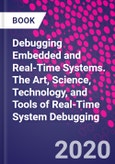Debugging Embedded and Real Time Systems
presents best practice strategies for debugging real-time systems, through real-life case studies and coverage of specialized tools such as logic analysis, JTAG debuggers and performance analyzers. It follows the traditional design life cycle of an embedded system and points out where defects can be introduced and how to find them and prevent them in future designs. It also studies application performance monitoring, the execution trace recording of individual applications, and other tactics to debug and control individual running applications in the multitasking OS.
Suitable for the professional engineer and student, this book is a compendium of best practices based on the literature as well as the author's considerable experience as a tools' developer.
Please Note: This is an On Demand product, delivery may take up to 11 working days after payment has been received.
Table of Contents
1. What's the Problem? 2. A Systematic Approach to Debugging3. Best practices for Debugging Software4. Best practices for Debugging Hardware5. In HW/SW Integration Phase6. An Overview of the Tools for Embedded Design and Debug7. Systems-on-Chip (FPGAs with embedded cores)8. Using On-Chip Debug Resources9. Testing Methods for Isolating Defects10. Defects in Real-time systems11. Debugging Real-Time Operating Systems (RTOS)12. Serial communications systems13. Networked systems14. Memory Systems15. The FutureAuthors
Arnold S. Berger Associate Professor, University of Washington, Bothell, USA. Arnold Berger has a Ph.D. in Material Science from Cornell University, with 20+ years of industrial experience, from hardware design engineer to Director of Research and Development (R&D) at several companies including Ford Motor Company, Hewlett-Packard, Advanced Micro Devices and Applied Microsystems. Dr. Berger has over 15 years' teaching experience and was the first Chair of the Division of Engineering and Mathematics in the School of STEM.Dr. Berger has published over 60 papers, holds four patents and has authored two textbooks on computer architecture and embedded design. His research interests include designing tools for debugging embedded systems, enabling remote access of student lab experiments, and automatic plagiarism detection.








